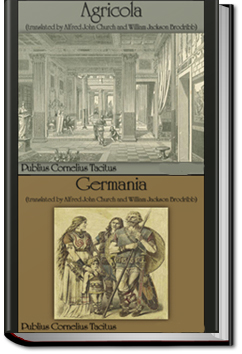The Agricola is a book by the Roman historian Tacitus, which recounts the life of his father-in-law Gnaeus Julius Agricola, an eminent Roman general. It also covers, briefly, the geography and ethnography of ancient Britain. As in the Germania, Tacitus favorably contrasts the liberty of the native Britons to the corruption and tyranny of the Empire; the book also contains eloquent and vicious polemics against the rapacity and greed of Rome. This translation by Alfred John Church and William Jackson Brodribb, was first published in 1877.
The Germania, is an ethnographic work on the Germanic tribes outside the Roman Empire. Germania fits squarely within the tradition established by authors from Herodotus to Julius Caesar. Tacitus himself had already written a similar essay on the lands and tribes of Britannia in his Agricola. The Germania begins with a description of the lands, laws, and customs of the Germanic people; it then segues into descriptions of individual tribes, beginning with those dwelling closest to Roman lands and ending on the uttermost shores of the Baltic, among the amber-gathering Aesti, the primitive and savage Fenni, and the unknown tribes beyond them.
(Summary by Wikipedia)
e Suevi.
The Gothini and Osi prove themselves not to be Germans; the first, by
their use of the Gallic, the second, of the Pannonian tongue; and both, by
their submitting to pay tribute: which is levied on them, as aliens,
partly by the Sarmatians, partly by the Quadi. The Gothini, to their
additional disgrace, work iron mines. [235] All these people inhabit but a
small proportion of champaign country; their settlements are chiefly
amongst forests, and on the sides and summits of mountains; for a
continued ridge of mountains [236] separates Suevia from various remoter
tribes. Of these, the Lygian [237] is the most extensive, and diffuses its
name through several communities. It will be sufficient to name the most
powerful of them—the Arii, Helvecones, Manimi, Elysii, and Naharvali.
[238] In the country of the latter is a grove, consecrated to religious
rites of great antiquity. A priest presides over them, dressed in woman's
apparel; but the gods worshipped there are said, according to the Roman
interpretation, to be Castor and Pollux. Their attributes are the same;
their name, Alcis. [239] No images, indeed, or vestiges of foreign
superstition, appear in their worship; but they are revered under the
character of young men and brothers. The Arii, fierce beyond the
superiority of strength they possess over the other just enumerated
people, improve their natural ferocity of aspect by artificial helps.
Their shields are black; their bodies painted: [240] they choose the
darkest nights for an attack; and strike terror by the funereal gloom of
their sable bands—no enemy being able to sustain their singular, and, as
it were, infernal appearance; since in every combat the eyes are the first
part subdued. Beyond the Lygii are the Gothones, [241] who live under a
monarchy, somewhat more strict than that of the other German nations, yet
not to a degree incompatible with liberty. Adjoining to these are the
Rugii [242] and Lemovii, [243] situated on the sea-coast&md



This 2009 Penguin Classics revised edition of the original 1948 Harold Mattingly translations of the 'Agricola' & 'Germania' features an introduction by J.B. Rives which in